The mobile terminal hosts guests and stations pod, while onboard. The crew has the primary control of Aquapod.
Aquapod
I have investigated creating a future vision of holistic sustainable marine tourism in 2030. The research and design has resulted in a mobile self-sustaining autonomous terminal that takes tourists to different locations. A specially designed capsule -Aquapod-, descends into the depth of ocean under controlled parameters where the guests go through a spiritual journey of excitement, realizations, awareness, education and responsibilities. From appreciation towards beautiful marine life to realizing how bleaching of corals is affecting them. To spectate the ocean cleanup project, realizing the reasons behind the ecosystem degradation, to what conservations are practiced today with coral farming is all a part of one’s expedition. The project promotes an integrated strategy for the world companies, local businesses and visionaries, at large. It demands to shift our thinking from 'maximizing profits' to 'maximizing benefits' for the environment, the economy, and local communities. Sustainable marine tourism can help us do that!
Project information
Reefs are habitat for a quarter of all forms of marine life on earth. They have major contribution to medicinal, fishing and marine tourism industry. Pollution, overfishing, global warming, climate change and human actions are all factors putting coral under great danger. Research portrays an exponential growth in marine tourism industry by year 2030. Unless carefully managed, tourism can pose a major threat to natural resources. The future of marine tourism is likely to be shaped by several factors, including technological advancements, environmental concerns, and changing consumer preferences. As technology continues to advance, there may be advancements in sustainable and environmentally friendly tourism practices. As a result, marine tourism operators may need to prioritize sustainable practices in order to attract and retain customers in the future. Overall, the future of marine tourism will likely be defined by a balance between technological innovation, environmental responsibility, and consumer demand.
Methods
Through this project, the author has hypothetically proposed a future driven by government organizations and the private sectors, coming together to mark sustainable prospects. Sea beyond- an initiative between UNESCO & Prada, is one such stakeholder pitched through this project. Sea beyond has been working towards ocean literacy for children in schools and kindergarten while aiming towards the ocean decade challenge 2030. Another stakeholder proposed is Dyson, well known for vacuum cleaners and air purifiers. Tech engineering by Dyson with continuous track of water quality index, bladeless propulsion that reduces noise pollution underwater and continuous monitoring/mapping ocean biodiversity, helps derive a coherent mobility. The project addresses SDG’s four, thirteen, fourteen and seventeen.
As a part of research, author reached out to scuba divers, initiated conversations with local practitioners and professionals working for this specific future causes. The author also signed up with various networks and channels to access first-hand information and insights into the domain. As a part of design development and understanding of parameters in marine mobility, it was a challenge to configure the ideations, but these were later supported by benchmarked companies, while learning of their packaging and technologies. The author used in-depth interview, questionnaire brainstorming, mapping requirements and profound personal experience to build a credible user scenarios and functionalities. The creative development process includes analogue and digital sketching, Alias modelling and VR ergonomic testing.
Result
The author has designed a coherent educative, fun engaging expedition in marine life. The project has tried creating an inclusive opportunity for all- kids starting early, adults and the elderly, especially abled in a wheelchair to be a part of this journey. Aquapod attains its energy from the terminal that is produced by solar energy panels and wave energy turbines. Aquapod’s advanced technology and purity of design makes it manufacturing friendly. Proposed materials are recycled nylon, matrec (recycled rubber wood & cork) and fiber reinforced PET (fabric from reused product). Innovation in materials helps achieve a better life span of product while reducing its carbon footprint. The information collected by Aquapod during each journey helps oceanographers and marine biologists for their study and research. Systematic trails are maintained during expedition without compromising disturbance to aquatic life. The project embarks on the importance of marine life, through tourism- a recreational experience along with realization and education! Awareness is a key towards sustainable development and ocean governance. It makes one responsible for their actions and decision making. Aquapod embraces the responsibility to create sustainable solution that not only meet the needs of today but also preserve the resources for tomorrow!
UID23 | Zain Kadri – Grad Project Presentation


Terminal is ready for boarding guests at Tulamben island port.
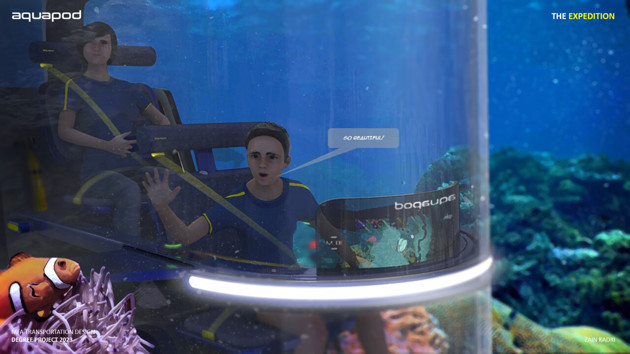
User gets first-hand experience to appreciate beautiful marine life and educate themselves of different aquatic species.

The guided tour takes users to observe effects of coral degradation and impact on marine life.
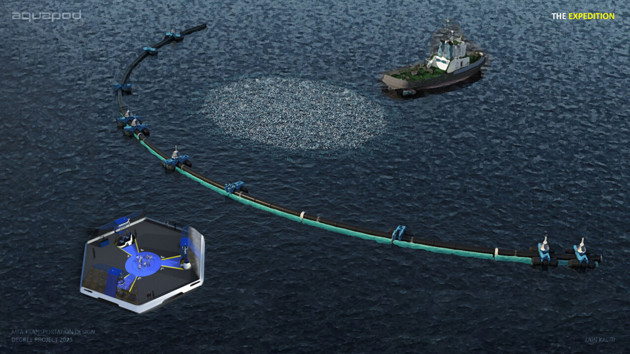
Terminal travels at a location close to ocean clean-up project practice.

Guests spectate the water pollution and realise the effects of their actions through observatory cabin in terminal.

Pod helps in education of coral farming and its advantages for future generations.

The awareness through expedition helps one become responsible and take necessary steps.

Final product Aquapod.

Aquapod scanning and mapping the ocean beds and marine life while on its journey.
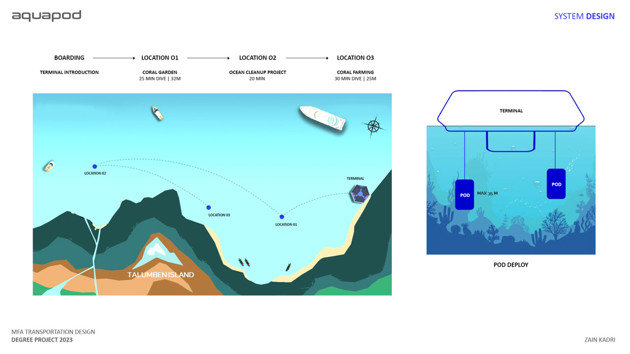
Journey mapping of expedition representing important locations for dive and spectating. Three pods deploy from station for a dive into the marine life.
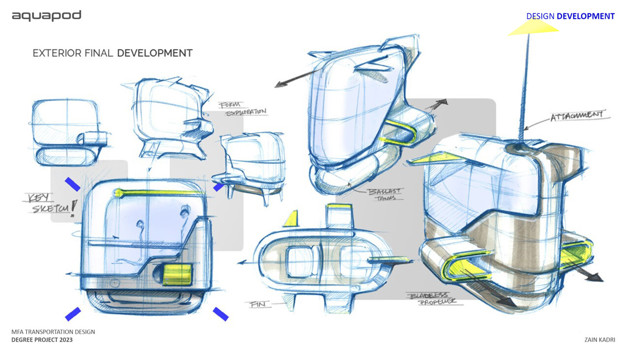
Final design exploration sketches and detail development.
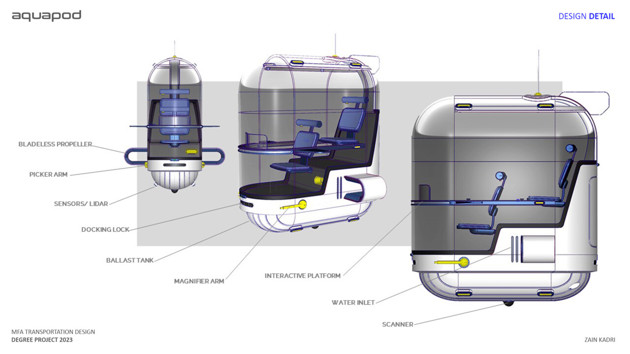
Simulation in 3D using Alias for refinements in design and ergonomic adjustments.

Design aesthetics and philosophy has been inspired by Dyson. Pure forms and technology are a major driving factor behind Aquapod.
















